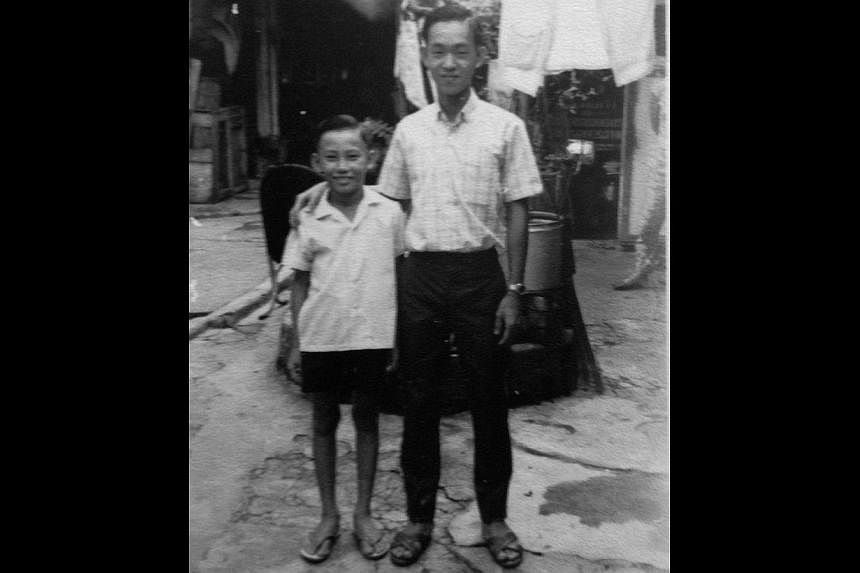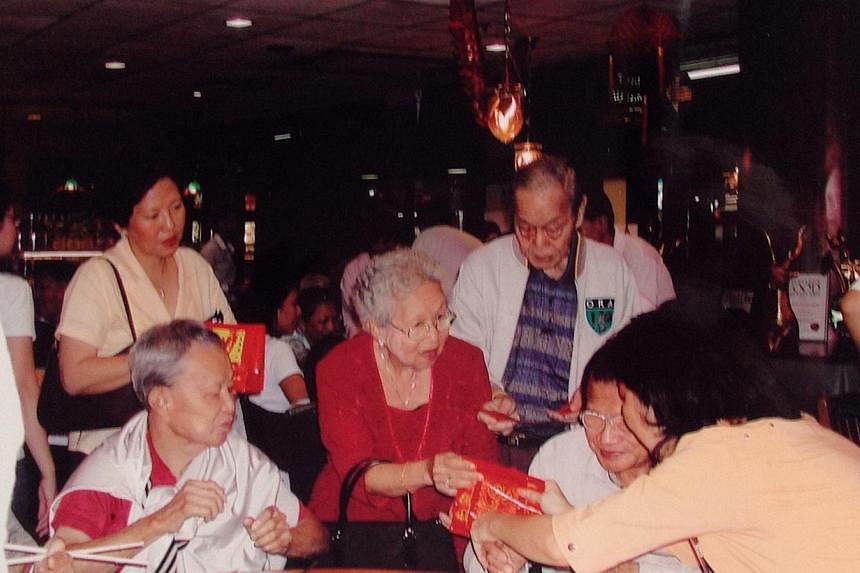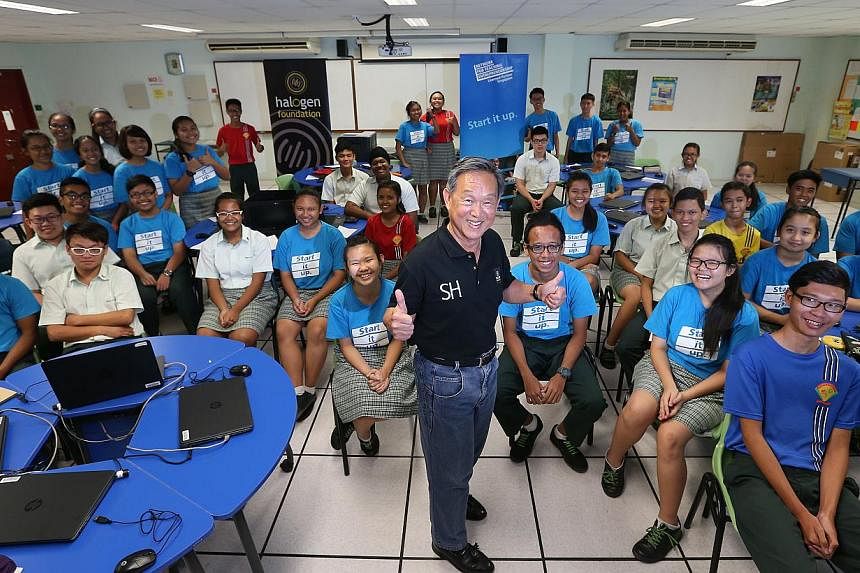This story was first published on April 12, 2015
Over the past few months, Mr Lim Soon Hock has spent many a late night dashing off e-mail to friends and business associates asking for money.
He is not in dire financial straits, but Halogen Foundation Singapore, a non-profit outfit dedicated to building young leaders which he chairs, needs support.
"It is doing good work but just not getting donors," says the 65-year-old technopreneur and private investor.
He is not about to let things slide, especially when he pushed the 12-year-old foundation to include entrepreneurial training, in addition to leadership education, when he became chairman two years ago. He also persuaded the board to focus Halogen's energies on helping youngsters at the lowest strata of society and those most at risk.
Halogen board member Cho Pei Lin, managing director of a media agency, says: "I'd wake up some mornings to find he had sent 30 e-mail in the middle of the night begging people to support us.
"I'm shocked. Why is he doing this and not enjoying his retirement? He doesn't need to be a professional beggar, he has achieved so much."
But Mr Lim says: "Losing is not in my vocabulary. I will play to win, when it is for a good cause."
If he seems partial to helping the deprived and the underprivileged, it is because he knows what it is like to be poor.
He is the eldest of four children of a clerk and a housewife. Home was a zinc hut in a Towner Road kampung where there was no electricity and residents shared common water points and toilets.
"Every night I had to help my father collect water to fill up two big oil drums and an earthen jar for the next day's usage," he recalls.
His siblings slept in the only bedroom with his parents; he slept on a mattress in the living room, where the family also cooked and ate.
His father worked for the Electricity Board and, as the only English-educated adult in the village, often translated and wrote letters for neighbours.
"They would thank him with gifts like cakes, tins of fruit, chickens or trays of eggs but he always rejected them. He'd say, 'I'm a civil servant. I can't take them unless you want me to lose my job and not be able to help you in future.'"
Mr Lim says his parents' kind and generous ways were pivotal in shaping his views on giving and volunteering.
"I saw first-hand how a little kindness could bring so much appreciation," he says.
A self-starter, he became head prefect of Towner Primary and made his school very proud by doing well enough to join Raffles Institution. But his first year at the premier boys' school was disastrous.
"I had red marks for all nine subjects. When I gave my report card to my father to sign, I thought he would shout at me. But he quietly signed it and then he said, 'You have been a big fish in a small pond. Now you have to learn to compete,'" he recalls.
He did well enough at the A levels to enter the then University of Singapore, and studied electrical engineering.
"It was tough. I almost left the course in the second year to come out and work, but Mum said no because it was just a short sacrifice," he says.
After graduating in 1973, he signed up as a defence engineer as part of his national service. As a Division One officer, he was paid $900 a month, a handsome salary in those days.
But it was not his to spend as he pleased. His father had just retired and one of his younger brothers was about to start university in London.
"Out of my $900, $500 went to pay for his education. The remaining, after deductions, went to support the family. I could not shirk my responsibilities as the eldest," he says.
To make ends meet, he taught evening classes at Singapore Polytechnic and tutored A-level students. Along the way, in 1976, he got married.
"From 1973 to 1977, I was often left with just $1 in my pocket at the end of the month. When that happened, I'd just drop in at the SAF cookhouses or my mother or mother-in-law's homes for my meals," recalls Mr Lim.
He left the army after seven years, and a distinguished corporate career followed. He started out as a senior electrical engineer with Mecomb, a company specialising in high-tech products and services, but was soon helping to steer some of the biggest multinationals in the country and region.
Among other things, he was the first Asian general manager of Digital Equipment, vice-president and managing director of Compaq in Asia-Pacific, and president of SITA Information Networking Computing.
Between 1989 and 1996, he grew Compaq's annual business from $50 million to more than $1.5 billion, three years ahead of the corporate goal set by then company president Eckhard Pfeiffer.
His former boss at Digital and his friends had told him he was signing up for failure when he took the Compaq job because Asia was probably the world's most difficult market for computers then.
"But it made me even more determined to succeed. It's always demanding and challenging when you are competing with the best. I learnt that if you want to dream big, you must be prepared to make hard choices and sacrifices to get to your final destination," he says.
It was not all peaks and no troughs. In late 1995, he made a risky career move by leaving Compaq to become president and CEO of Australia-listed Matrix Communications, a mobile messaging firm.
That was prompted by a desire to ride the tidal telco wave, the promise of a US$50 million (S$68.4 million) kitty to reshape the company, and the freedom to spend 15 per cent of his time on his personal entrepreneurial ventures.
It did not work out due to differences with the board and joint-venture partners, and he left the company after 18 months.
By then he had already set up a boutique consultancy, Plan-B ICAG (International Corporate Advisory Group), which he still runs today.
He could have taken it easy, but SITA - a multibillion-dollar company which provides data services and IT solutions to the air transport industry - offered him a deal too good to turn down. What was meant to be a two-year stint turned into nearly five sterling years at its helm.
In 40 years of his working life, Mr Lim has spent more than 25 years in public service - sitting on various boards in public-listed companies, government agencies and civic organisations including the National Family Council.
The recipient of a Public Service Star, a Public Service Medal and various other accolades, he is also a Justice of the Peace and a volunteer mediator with the courts.
"'No time' should never be an excuse for not giving or volunteering. I also believe that no effort is too small, and no skill or action too insignificant," says Mr Lim, who has authored two books - Vantage Views and Vantage Views II - which contain his thoughts on contemporary issues. He donated the proceeds - about $150,000 from the first, $200,000 from the second - to the Dr Ong Chit Chung Bursary Awards fund for needy students and the Institute of Engineers Singapore respectively.
Mr Lim and his wife, a former accounting manager, have three children aged between 26 and 33, and one 10-month-old granddaughter.
Like his own father who spent a lot of time with him and his siblings, he is a hands-on parent.
Prior to becoming chairman of Halogen, he spent almost a decade chairing the Centre for Fathering where he relentlessly pushed for the active involvement of fathers in raising their children.
When he stepped down as chairman, he had raised a war chest of more than $2.5 million, improved corporate governance, and got the group a 4,000 sq ft centre in Toa Payoh.
At Halogen, one of the initiatives he is most proud of is securing a licensing arrangement with the Network For Teaching Entrepreneurship (NFTE), an American institution acclaimed for its youth entrepreneurship programme.
Like NFTE's CEO Shawn Osborne, he is convinced that entrepreneurship is a key 21st-century workforce skill, and that learning about entrepreneurship ignites an entrepreneurial mindset in young people.
The programme - the only structured entrepreneurship curriculum offered by an Institution of Public Character in Singapore - was rolled out last June. So far, 141 Normal Technical stream students from 11 schools have attended it, and the response has been overwhelmingly positive.
Getting support has been challenging, but Mr Lim is not giving up. But he is not about to accept money from anybody.
"If you are giving me money because you know I have a cashflow problem, I don't want it. But if you are giving it to me because you think it's a good cause, I'll take it gladly."
He is already planning to donate the proceeds from his third book to the cause. Osim chairman Ron Sim has agreed to underwrite the printing costs as well as the target sum of $250,000.
"I've said losing is not in my vocabulary," he says. "In this new pursuit, my best win has yet to come. I look forward to our youth changing my life, when Halogen succeeds in uplifting more of them, especially those who need the most help."



